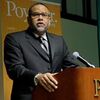The Supreme Court is hearing oral arguments in a big case involving the US Census. The Commerce Department wants to include a question in the census about US citizenship. Critics say that will tamp down participation in the census and will result in an inaccurate population head count. The census helps determine how congressional districts are drawn, as functions of population. According to the Washington Post, the Supreme Court's ideological divide was on full display Tuesday, and it seemed from their questioning that the court's conservatives were likely to defer to the Trump administration on adding a question concerning citizenship to the 2020 census form sent to every American household. How important is this issue, what does it mean for the country, and what does it say about the court?
Alex Rubinstein has a great story in MintPress News, entitled "With US on the Warpath, Iran's Press TV the Latest Target for Google's Political Censorship." According to Alex, Press TV — the Iranian government-funded TV news outlet — has been "shut down" on Google's platforms, including YouTube and Gmail. The move coincides with similar action taken against HispanTV, an Iranian Spanish-language channel. With increasing repression of Iran's official vehicles of communication to the world, the country's voice is stifled in front of international audiences — and that's the goal. "The Google account for [Press TV] was disabled and can't be restored because it was used in a way that violates Google's policies," the company told the outlet in an email. What's really at stake here? The US seems to be pulling out all the stops and using all technologies on the countries that it has issues with.
Journalist and activist Kevin Zeese is part of a group opposed to the prospect of the Venezuelan opposition taking over the country's embassy in Washington, DC. He writes that the group's members "have been living inside the building for the past two weeks, working side-by-side with the skeletal Venezuela diplomatic staff that has been told by the State Department that they must leave by April 24. Calling ourselves the Embassy Protection Collective, we have been working in the embassy during the day, holding educational events every evening, making banners and signs, and sleeping on couches at night. The evening events have included seminars on Julian Assange, US foreign policy in Africa, the history of Venezuela, and updates on Honduras and El Salvador." He states, "The Collective has good reason to believe the embassy is under attack. On March 18, representatives of Venezuelan opposition leader Juan Guaido took over the military attaché building on 2409 California St. in Washington, DC, with the help of the DC Police and Secret Service. On that same day, they also took over the Venezuelan Consulate in New York City." What's going on here, and what's behind their fight?
GUESTS:
Leslie Proll — Civil rights lawyer, advisor to the NAACP on judicial nominations, former NAACP Legal Defense and Educational Fund policy director and former Alabama director of the US Department of Transportation.
Kevin Zeese — Co-coordinator of Popular Resistance, whose work is at popularresistance.org.
Chris Garaffa — Web developer and technologist.
We'd love to get your feedback at radio@sputniknews.com



